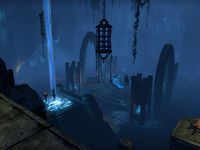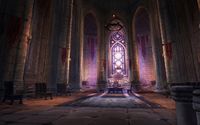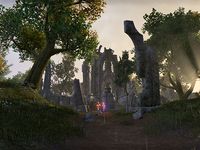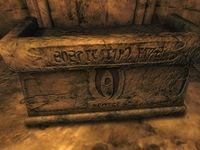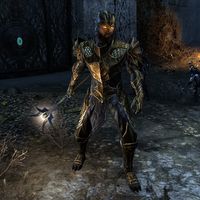Lore:Daedraphiles
The Daedraphiles were a faction of Ayleids who worshipped the Daedra. They can be contrasted with the older, Aedra-worshipping culture of the Barsaebic Ayleids. Unlike their more conservative cousins, the Ayleid clans that adopted Daedra worship were noted for their decadent and vigorous societies.[1]
The Daedraphiles followed the Eleven Edicts of the Ten Ancestors, and believed that the Ten Ancestors venerated by the Ayleids were in fact Daedra worshippers.[2]
History[edit]
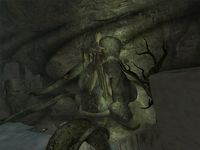
Daedra worship can be traced back to the Aldmer of the Summerset Isles, who were the first to begin organized worship of both the Aedra and Daedra. However, the strictures of Aldmeri regulation forbade the worship of Daedra. The Ayleids departed Summerset for the Heartlands of Cyrodiil, in some cases specifically to evade such strictures. In the last millennium of the Merethic Era, as Ayleid culture flourished on the continent, worship of the Daedric Princes took hold. Although the Aedra were still widely revered, Daedric worship began to spread among the Ayleids, initially tolerated and later celebrated.[3]
Unlike the Chimer, the Ayleids made no distinction between good and bad Daedra. Indeed, many of the cruellest Princes received mass veneration when their worship was adopted by Ayleid kings and aristocrats. Some scholars believe that the nature of these Daedric cults influenced the practice of systematic slavery of Nedes within the Ayleid Empire.[3] Although also practiced by the Barsaebics, Daedra-inspired "arts" such as flesh-sculpture and gut-gardening were inflicted on these Nedic slaves to honor the Princes.[3][4]
Daedraphile dominance of Ayleid culture was the result of the Narfinsel Schism, a civil conflict that spanned the Late Merethic Era to 1E 198 between the Aedra-worshipping clans and the Daedraphile clans. The conflict was ended in 1E 198, when King Glinferen of Atatar led a combined force of Daedraphile warriors against the traditionalist Barsaebic forces of Wendelbek, driving the Aedra worshippers from the Heartlands and into Black Marsh. The Scouring of Wendelbek marked the end of any organized resistance to Daedra worship in Cyrodiil.[1]
Widespread worship of the Daedric Princes is one of several factors attributed to the downfall of the Ayleid Empire, culminating with the Alessian Slave Rebellion and the fall of White-Gold Tower in 1E 243.[1] The rebellion itself was fueled largely by desperate rage against the Ayleids' Daedra-inspired cruelty, and the Ayleid kings who aligned themselves with the slaves were Aedra worshippers.[3] Circa 1E 242, King Glinferen sent an envoy to Twyllbek seeking the aid of the exiled Barsaebics, who bluntly refused to help.[5] The gods themselves appear to have turned against the Ayleids, with Kyne answering Alessia's prayers by sending her son Morihaus to aid her,[6] and the Eight Divines granting Pelinal Whitestrake a set of powerful relics to fight back against the Ayleid Sorcerer-Kings.[7] Alessia herself was granted the Amulet of Kings by Akatosh, and entered into a Covenant with the Dragon God of Time to keep the Dragonfires lit as a barrier against Daedric invasion.[8]
Following the fall of White-Gold Tower, most Ayleid clans who weren't slaughtered eventually ended up fleeing Cyrodiil, becoming what would later be known as the Ayleid Diaspora.[1] The Aedra-worshipping Ayleid kings were rewarded by Queen Alessia, who incorporated some of the Elven Aedra into the First Empire's worship of the Eight Divines. The Empire outlawed the worship of the Daedric Princes, and Daedra-worshipping Ayleids were exterminated wherever they were found. Thus, by the middle of the First Era, large-scale Daedra worship was extinct in central Tamriel.[3][9]
Legacy[edit]
The revulsion for Daedra worship that pervades most human cultures in Tamriel probably originated from the treatment of Nedic slaves by the Daedraphiles in the Late Merethic.[3]
The Hollow City of Coldharbour is a lasting relic of the Daedraphiles. This city was populated by both men and Ayleids, and its denizens worshipped the Daedric Prince Meridia at a glorious cathedral known as the Chapel of Light. At some point, the city was besieged by the forces of Molag Bal, and it became clear that the city would fall. Seeing an opportunity to preserve the city and fight back against her rival Prince, Meridia used the invaders' portals to Coldharbour to pull the city into Molag Bal's own realm, where it remains to this day as a refuge for mortals within an otherwise hostile realm.[10][11]
It is theorized that a sect or cult of Nibeneans attempted to emulate Daedraphile worship of Daedric powers in the First Era when they constructed Deepscorn Hollow as a temple to Sithis.[12]
Following his defeat at the hands of Pelinal Whitestrake, the Ayleid Sorcerer-King Umaril the Unfeathered survived with Meridia's aid. The Prince granted Umaril's soul refuge in the Colored Rooms, where he would remain for millennia. Circa 3E 433, Umaril's body was reformed in the Fires of Oblivion, and he returned to Tamriel to reclaim his seat at Garlas Malatar and cast down the mortal gods who opposed him. He began a systematic campaign against the Church, sending his Auroran minions to desecrate Cyrodiil's great chapels in an attempt to end the worship of the Nine Divines.[7] He was ultimately defeated by the Knights of the Nine, led by the Divine Crusader, at a final confrontation within Garlas Malatar. Wielding the ancient relics of Pelinal together with the Blessing of Talos, the Crusader defeated Umaril's physical form and destroyed his immortal soul.[13]
Gallery[edit]
Abagarlas, an Ayleid city devoted to Molag Bal (ESO)
The ruins of Atatar, once home to the Atataric clan of Daedraphiles (Oblivion)
Ceyatatar, domain of Hadhuul the Fire King (ESO)
King Narilmor of Garlas Malatar, one of Meridia's Purified (ESO)
See Also[edit]
- Barsaebic Ayleids — An Aedra-worshipping Ayleid subculture that emerged following the Narfinsel Schism
- Ayleid Ruins
Books[edit]
- The Amulet of Kings by Wenengrus Monhona — Chronicles the creation of the Amulet of Kings
References[edit]
- ^ a b c d Ayleid Survivals in Valenwood — Cuinur of Cloudrest, 4th Tier Scholar of Tamrielic Minutiae
- ^ The Library of Dusk: Rare Books
- ^ a b c d e f Daedra Worship: The Ayleids — Phrastus of Elinhir
- ^ Captured Time quest in ESO
- ^ Chancellor Abnur Tharn Answers Your Questions — Chancellor Abnur Tharn
- ^ The Song of Pelinal, v 2
- ^ a b The Prophet's dialogue in Oblivion
- ^ Trials of St. Alessia
- ^ Caledonia Gregorius' dialogue in ESO
- ^ The Groundskeeper's dialogue in ESO
- ^ The Hollow City in ESO
- ^ Notes of Lovirithel the Sage — Lovirithel the Sage
- ^ Umaril the Unfeathered quest in Oblivion
| ||||||||||||||||||||||||||||||||||||||||||||||||||||||||

